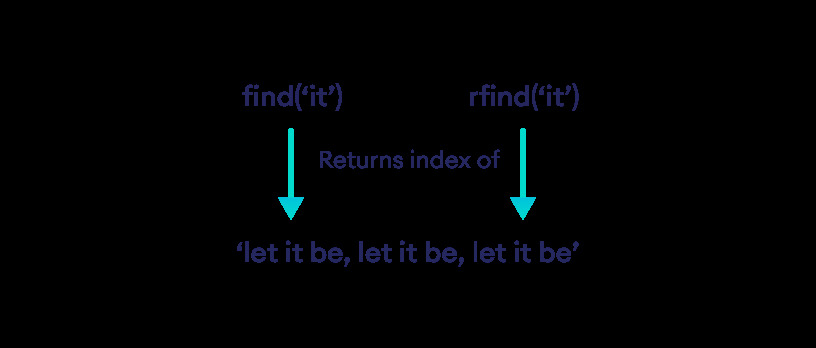rfind() 方法返回子字符串的最高索引(如果找到)。如果未找到,则返回 -1。
用法:
str.rfind(sub[, start[, end]] )
参数:
rfind() 方法最多接受三个参数:
- sub - 这是要在
strString 。 - start和结尾(可选)- 在其中搜索子字符串
str[start:end]
返回:
rfind() 方法返回一个整数值。
- 如果字符串中存在子字符串,则返回找到子字符串的最高索引。
- 如果字符串中不存在子字符串,则返回 -1。

示例 1:rfind() 没有开始和结束参数
quote = 'Let it be, let it be, let it be'
result = quote.rfind('let it')
print("Substring 'let it':", result)
result = quote.rfind('small')
print("Substring 'small ':", result)
result = quote.rfind('be,')
if (result != -1):
print("Highest index where 'be,' occurs:", result)
else:
print("Doesn't contain substring")
输出
Substring 'let it': 22 Substring 'small ': -1 Highest index where 'be,' occurs: 18
示例 2:rfind() 带有 start 和 end 参数
quote = 'Do small things with great love'
# Substring is searched in 'hings with great love'
print(quote.rfind('things', 10))
# Substring is searched in ' small things with great love'
print(quote.rfind('t', 2))
# Substring is searched in 'hings with great lov'
print(quote.rfind('o small ', 10, -1))
# Substring is searched in 'll things with'
print(quote.rfind('th', 6, 20))
输出
-1 25 -1 18
相关用法
- Python String rsplit()用法及代码示例
- Python String rpartition()用法及代码示例
- Python String replace()用法及代码示例
- Python String rindex()用法及代码示例
- Python String rjust()用法及代码示例
- Python String rstrip()用法及代码示例
- Python String Center()用法及代码示例
- Python String decode()用法及代码示例
- Python String join()用法及代码示例
- Python String casefold()用法及代码示例
- Python String isalnum()用法及代码示例
- Python String startswith()用法及代码示例
- Python String splitlines()用法及代码示例
- Python String upper()用法及代码示例
- Python String isprintable()用法及代码示例
- Python String translate()用法及代码示例
- Python String title()用法及代码示例
- Python String split()用法及代码示例
- Python String format_map()用法及代码示例
- Python String zfill()用法及代码示例
注:本文由纯净天空筛选整理自 Python String rfind()。非经特殊声明,原始代码版权归原作者所有,本译文未经允许或授权,请勿转载或复制。
